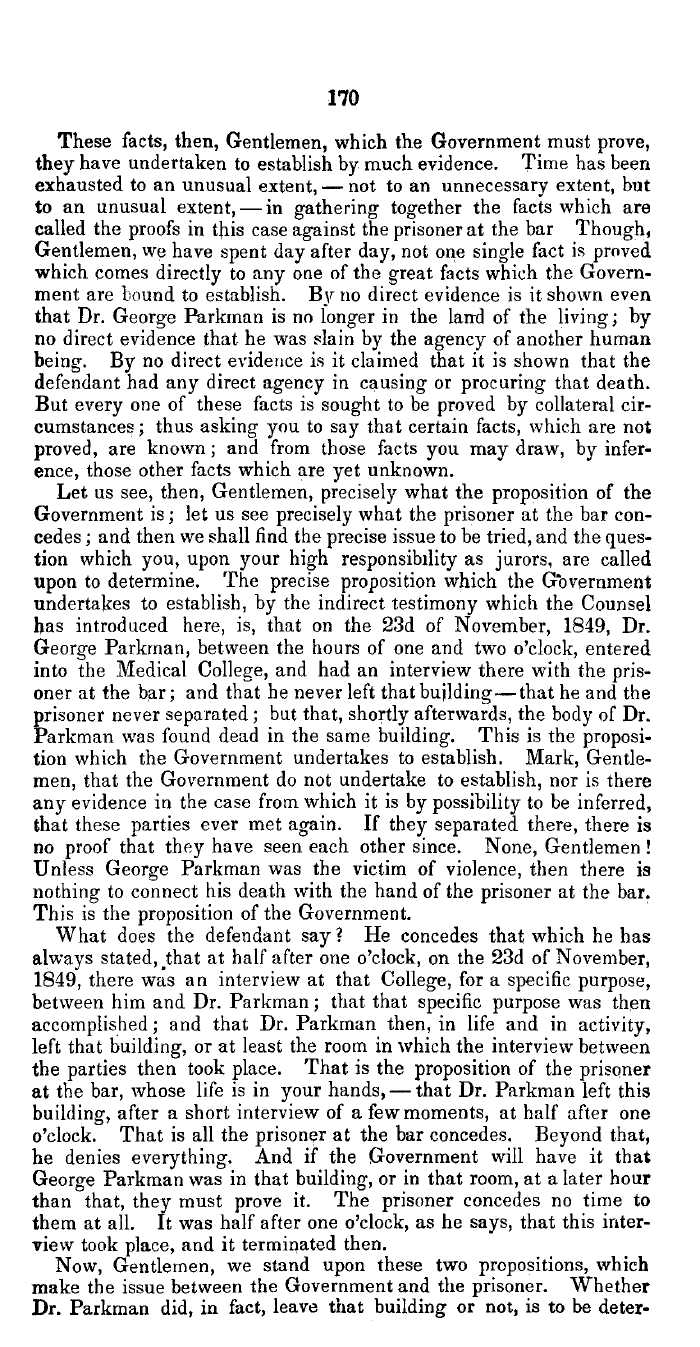|
170
These facts, then, Gentlemen, which the Government must prove,
they have undertaken to establish by much evidence. Time has been
exhausted to an unusual extent, - not to an unnecessary extent, but
to an unusual extent,-in gathering together the facts which are
called the proofs in this case against the prisoner at the bar Though,
Gentlemen, we have spent day after day, not one single fact is proved
which comes directly to any one of the great facts which the Govern-
ment are bound to establish. By no direct evidence is it shown even
that Dr. George Parkman is no longer in the land of the living; by
no direct evidence that he was slain by the agency of another human
being. By no direct evidence is it claimed that it is shown that the
defendant had any direct agency in causing or procuring that death.
But every one of these facts is sought to be proved by collateral cir-
cumstances; thus asking you to say that certain facts, which are not
proved, are known; and from those facts you may draw, by infer-
ence, those other facts which are yet unknown.
Let us see, then, Gentlemen, precisely what the proposition of the
Government is; let us see precisely what the prisoner at the bar con-
cedes; and then we shall find the precise issue to be tried, and the ques-
tion which you, upon your high responsibility as jurors, are called
upon to determine. The precise proposition which the Government
undertakes to establish, by the indirect testimony which the Counsel
has introduced here, is, that on the 23d of November, 1849, Dr.
George Parkman, between the hours of one and two o'clock, entered
into the Medical College, and had an interview there with the pris-
oner at the bar; and that he never left that building-that he and the
prisoner never separated; but that, shortly afterwards, the body of Dr.
Parkman was found dead in the same building. This is the proposi-
tion which the Government undertakes to establish. Mark, Gentle.
men, that the Government do not undertake to establish, nor is there
any evidence in the case from which it is by possibility to be inferred,
that these parties ever met again. If they separated there, there is
no proof that they have seen each other since. None, Gentlemen !
Unless George Parkman was the victim of violence, then there is
nothing to connect his death with the hand of the prisoner at the bar.
This is the proposition of the Government.
What does the defendant say? He concedes that which he has
always stated, that at half after one o'clock, on the 23d of November,
1849, there was an interview at that College, for a specific purpose,
between him and Dr. Parkman ; that that specific purpose was then
accomplished; and that Dr. Parkman then, in life and in activity,
left that building, or at least the room in which the interview between
the parties then took place. That is the proposition of the prisoner
at the bar, whose life is in your hands,-that Dr. Parkman left this
building, after a short interview of a few moments, at half after one
o'clock. That is all the prisoner at the bar concedes. Beyond that,
he denies everything. And if the Government will have it that
George Parkman was in that building, or in that room, at a later hour
than that, they must prove it. The prisoner concedes no time to
them at all. It was half after one o'clock, as he says, that this inter-
view took place, and it terminated then.
Now, Gentlemen, we stand upon these two propositions, which
make the issue between the Government and the prisoner. Whether
Dr. Parkman did, in fact, leave that building or not, is to be deter-
|

